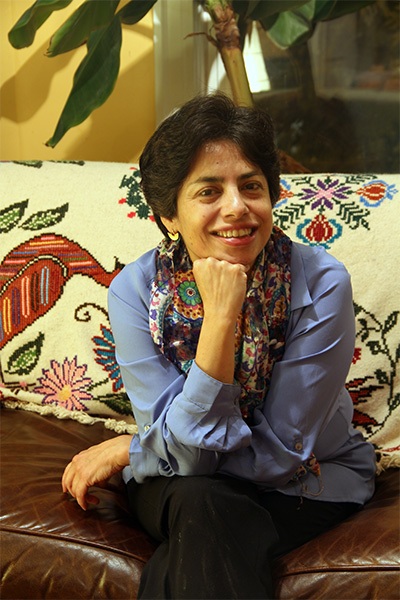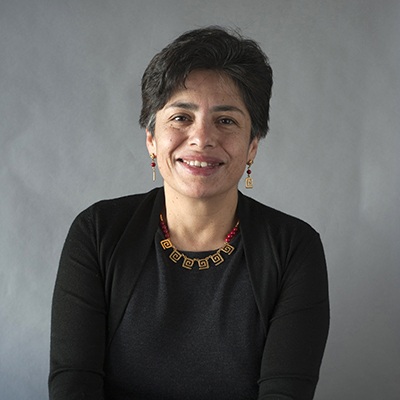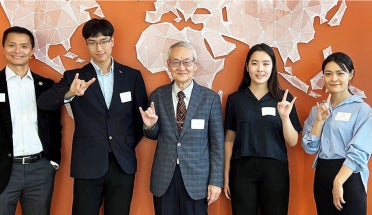
LLILAS Director Fosters Transformation via Internationalization
- Aug 23, 2023
- Global Alumni Relations
- by Alex Briseño
As the director of the Teresa Lozano Long Institute of Latin American Studies (LLILAS) at The University of Texas at Austin, the origin of Adela Pineda Franco’s affinity for language, culture and literature is an organic one. It dates back to her childhood in Puebla, Mexico, where she found herself surrounded by a multitude of languages and dialects.
“My parents are both Mexican but from very different backgrounds,” Pineda Franco said. “My mother is from central Mexico, but my father and grandmother are from the south. My grandmother’s first language was Zapotec. She was very proud of her region, as was my father.”
This meant Pineda Franco interacted with a range of languages from a young age. In addition to speaking Spanish and English, she also learned French and German.
“I have an ability to learn languages because I was exposed to so many different regional cultures and languages all the time,” Pineda Franco said. “That’s why I wanted to study comparative literature. I didn’t want to study strictly Mexican or strictly Latin American literature only. I wanted to compare languages and cultures.”

Pineda Franco’s desire to further her education brought her to UT Austin, where she arrived as a student pursuing a master of arts in Latin American studies.
"It was August when I came for the first time to the U.S. as a first-year MA student, so I was sweating on the way to class,” Pineda Franco said. “I was raised in Puebla, Mexico, where the weather is very nice, not too hot. And I thought to myself, ‘Can I make it here? Can I stay here for the next four years?’ ”
While it was her first time in the U.S., both Austin and the University quickly became one of her many home-away-from-home communities. Pineda Franco not only adjusted to the weather, but she even remained in town to earn her doctoral degree in comparative literature at UT Austin.
“I was so impressed that, in Texas, I could learn more about Mexico and the other Latin American countries than I could in my hometown in Mexico,” Franco said. “Why is this? Because there was a congregation of amazing people — professors and classmates — paired with great libraries and resources.”
After earning her Ph.D., Pineda Franco headed to Boston University, where she founded and directed the Center of Latin American Studies and spent 20 years teaching as a professor of Latin American literature and film. Her time as a director at BU helped her discover a desire to learn more about topics on which she isn’t an expert.
“I thought it was so cool to listen to political scientists, anthropologists and sociologists. The thing I enjoy about directing a center is that you are a mediator of possibilities,” Pineda Franco said. “Then I thought, ‘How can we connect people? How do you get resources? How do you talk to foundations?’ This is also a very important aspect of an academic career, and it just came naturally.”
Returning to the Forty Acres
Boston became home for Pineda Franco and her family. It’s where she raised her kids and built another community. That’s what made it so difficult to say goodbye after the opportunity to direct LLILAS presented itself.
“It was not an easy decision. I spent 20 years of my life in Boston; that’s a long time,” Pineda Franco said. “My decision, in part, was because of the pandemic. That was a period of reflection. I’ve always thought you should not stay where you are comfortable only. I was reaching that point of my career where, of course, I was researching and had my beloved students, but I didn’t have the infrastructure to do more.”
Pineda Franco never expected to return to UT Austin. It’s largely uncommon for faculty members to return to their alma maters during their academic careers, she noted. But for her, the timing, combined with the opportunity to lead LLILAS, felt undeniable.
“I was attracted to LLILAS not only because [UT] is my alma mater, but also, when I was reading about LLILAS, I saw how transformative it had been for the last 20 years, particularly because of its partnership with the Benson Collection, which is an amazing library,” Pineda Franco said. “It also acquired a high reputation through endowments and grants from huge foundations like Tinker and Mellon.”
As she puts it: If you don’t have the means, you can’t do anything. Among the many reasons she was pulled to LLILAS, Pineda Franco thought, ‘If we have this kind of support, we are going to be able to implement new strategies.’
"You can approach the region in very different ways, but what I learned as a director is the importance of growing interdisciplinary and interregional knowledge. That’s at the core of the mission of any institution that is international."
Expansion and interconnection are the philosophies she brings to her roles as LLILAS director and Lozano Long Endowed Professor in Latin American Literary and Cultural Studies.
“My vision has not changed that much in my concept of Latin America because it is a concept that brings nations with very different cultures and societies together under the same umbrella,” Pineda Franco said. “You can approach the region in very different ways, but what I learned as a director is the importance of growing interdisciplinary and interregional knowledge. That’s at the core of the mission of any institution that is international.”
Transformation via Internationalization
Attracted by the University’s rejuvenated commitment to internationalization and global impact — not to mention its proximity to Latin America — Pineda Franco officially returned to UT Austin in 2021 after a 20-year absence, heading the Latin American studies program.
This time around, she finds herself and LLILAS uniquely positioned to grow collaborations across the Forty Acres and beyond. This comes, in part, as a result of the reinvigorated pledge to internationalization, which is evident in the University’s 10-year strategic plan, Change Starts Here.
This global commitment will also take center stage in Mexico City during the upcoming Feria Internacional del Libro de las Universitarias y los Universitarios 2023, known popularly as FILUNI. UT Austin is the first university from the U.S. to participate as the guest of honor at the multinational book fair and conference, which is expected this year to attract more than 35,000 participants from 10 countries. Set for Aug. 29-Sept. 3, FILUNI will take place on the campus of the Universidad Nacional Autónoma de México (UNAM) in Mexico City, a premier university in Latin America.
UT Austin is sending the largest international delegation in its history to FILUNI, featuring more than 130 faculty members, graduate students, performers, staff members, campus leaders, and alumni representing 20 colleges, schools and units.

FILUNI’s thematic programming revolves around the research themes of the University’s strategic plan, positioning UT Austin’s delegation to participate in more than 50 roundtable discussions, research symposia, book presentations, live podcasts, musical performances, film screenings and exhibits.
For Pineda Franco, FILUNI allows her to merge her passions for Latin America, literature and collaboration. FILUNI also offered her the opportunity to work with Socorro Venegas, the general director of Publications and Editorial Development at UNAM.
Pineda Franco and Venegas, who are both writers and editors, assembled a team of contributors from UNAM and UT Austin. Together, they published “El árbol de la palabra. Revitalización de lenguas indígenas en Abya Yala (The word tree. Revitalization of indigenous languages in Abya Yala),” which will be presented at FILUNI.
“This book is about Indigenous languages. Socorro Venegas and I decided to work with five contributors from UT Austin and five contributors from UNAM, all of them scholars or people with close, close ties to the Indigenous communities,” Pineda Franco said. “In this book, we pose the question: Why do we need to revitalize Indigenous languages? This question, which was addressed in different ways, is a major project I was involved with as an editor.”
UT and LLILAS on the Global Stage
Pineda Franco served also as the Texas Global FILUNI task-force point person for the College of Liberal Arts (COLA), affording her the opportunity to engage with faculty and students presenting their FILUNI proposals, which ranged from digitization projects to book presentations across multiple COLA disciplines.
She is especially looking forward to witnessing the work of Melissa Guy, librarian and director of the Nettie Lee Benson Latin American Collection, who curated an exhibition of 19th- and 20th-century Mexican holdings that were featured in a digitization project. She is also eager to attend a seminar titled “Behind the Indigenous Communal Lands,” by Matthew Butler, a historian and associate professor in COLA’s Department of History.
“This is a major, major event that Texas Global is doing. It’s something new for us, and it’s with a Latin American university. As the head of Latin American studies at UT Austin, I couldn’t be happier because Mexico is my country. This says a lot about the University and its continued efforts to strengthen U.S., Mexican and Latin American relations.”
Perhaps what Pineda Franco is most excited about, though, are the future collaborations that will stem from the weeklong conference in Mexico City.
“This is bringing together students from Latin America and UT Austin. Many UNAM students are going to attend these sessions. They are going to see the professors and fellow UT Austin students, and many UT Austin students and faculty are going to see what a great university UNAM is,” Pineda Franco said.
She added, “This is the beginning of future collaborations. They always start with something real and concrete: a talk, a project, a thesis. FILUNI is going to be an expo in this sense — an expo that not only brings countries together but also fosters a dialogue about science, art, humanities and culture.”
Pineda Franco explained that, in academia, it’s easy to feel siloed in your research. But FILUNI, she noted, provides the impetus to break down some of those silos with collaboration. The conference additionally brings together both sides of the border and beyond, fostering a truly international dialogue on topics ranging from art and the environment to engineering, health, and human rights.
“This is a major, major event that Texas Global is doing. It’s something new for us, and it’s with a Latin American university. As the head of Latin American studies at UT Austin, I couldn’t be happier because Mexico is my country,” Pineda Franco said. “This says a lot about the University and its continued efforts to strengthen U.S., Mexican and Latin American relations.”



